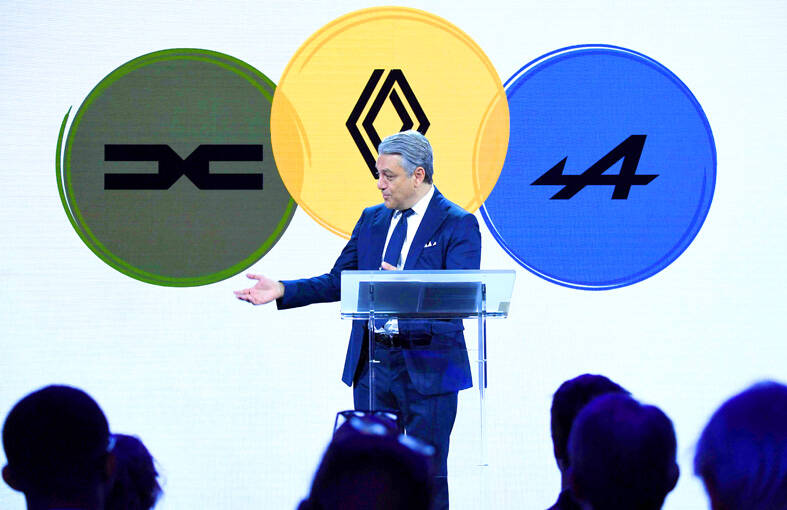Renault SA and China’s Geely Holding Group Co (吉利控股集團) yesterday announced a 50-50 joint venture to supply gasoline engines and hybrid technology to their brands and other automakers, in the latest step in the French automaker’s complex restructuring.
As well as carving out its internal combustion engine business to focus on electric vehicles, Renault is trying to revamp its alliance with Nissan Motor Co, aiming to convince its Japanese partner to invest in its new electric unit.
The scale of Renault’s planned overhaul — encompassing the gasoline engine business it has code-named “Horse” and the electric one code-named “Ampere” — speaks to the pressure automakers feel from investors and regulators to quicken their move to electric vehicles, with Europe having effectively banned combustion engines from 2035.

Photo: AFP
Renault’s joint venture with Geely would employ 19,000 people at 17 powertrain factories, and three research and development hubs, the companies said, adding that they expect to reach a final agreement and launch the new company next year.
It was not immediately clear whether the venture represents a step toward even closer collaboration on gasoline vehicles.
The preliminary agreement follows at least three months of negotiations and is non-binding, a person with knowledge of the terms told reporters.
The new company would be based in London, said the person, who was not authorized to speak to media and declined to be identified.
Renault and Geely would each hold 50 percent, the companies said in a statement that did not detail other financial terms.
For Geely, the deal extends its pattern of building partnerships to expand beyond China. It also owns Volvo Cars and has a stake in Mercedes-Benz.
Still, the outcome of Renault’s talks with Nissan remain an open question. Nissan has said it is considering an investment in the Ampere electric venture.
However, Nissan has raised concerns about the treatment of intellectual property, including battery and powertrain technology, in its talks with Renault and has indicated those concerns extend to any partnership the French automaker strikes with Geely, people with knowledge of the discussions said.
Renault and Geely said they expect their new joint venture would supply internal combustion engines and hybrid powertrains to Nissan and the junior partner in Renault’s existing alliance, Mitsubishi Motors.
The venture would have the capacity to supply about 5 million engines and hybrid systems per year once operational, the companies said.
The announcement came ahead of Renault’s capital markets day yesterday in Paris where chief executive Luca de Meo was scheduled to update investors on strategy.
Ahead of the presentation, Renault said it aimed for an 8 percent operating margin by 2025, compared with the 5 percent expected this year, thanks to the plan to carve out the electric unit. The margin is seen rising to more than 10 percent in 2030.
De Meo has said Renault was seeking a partner that would bring scale and drive down cost in its internal combustion business, including hybrids.
Renault and Geely have an existing joint venture in South Korea.
Separately, Volvo Cars said it would divest its 33 percent stake in its Aurobay unit to Geely, without disclosing terms.

CAUTIOUS RECOVERY: While the manufacturing sector returned to growth amid the US-China trade truce, firms remain wary as uncertainty clouds the outlook, the CIER said The local manufacturing sector returned to expansion last month, as the official purchasing managers’ index (PMI) rose 2.1 points to 51.0, driven by a temporary easing in US-China trade tensions, the Chung-Hua Institution for Economic Research (CIER, 中華經濟研究院) said yesterday. The PMI gauges the health of the manufacturing industry, with readings above 50 indicating expansion and those below 50 signaling contraction. “Firms are not as pessimistic as they were in April, but they remain far from optimistic,” CIER president Lien Hsien-ming (連賢明) said at a news conference. The full impact of US tariff decisions is unlikely to become clear until later this month

With an approval rating of just two percent, Peruvian President Dina Boluarte might be the world’s most unpopular leader, according to pollsters. Protests greeted her rise to power 29 months ago, and have marked her entire term — joined by assorted scandals, investigations, controversies and a surge in gang violence. The 63-year-old is the target of a dozen probes, including for her alleged failure to declare gifts of luxury jewels and watches, a scandal inevitably dubbed “Rolexgate.” She is also under the microscope for a two-week undeclared absence for nose surgery — which she insists was medical, not cosmetic — and is

GROWING CONCERN: Some senior Trump administration officials opposed the UAE expansion over fears that another TSMC project could jeopardize its US investment Taiwan Semiconductor Manufacturing Co (TSMC, 台積電) is evaluating building an advanced production facility in the United Arab Emirates (UAE) and has discussed the possibility with officials in US President Donald Trump’s administration, people familiar with the matter said, in a potentially major bet on the Middle East that would only come to fruition with Washington’s approval. The company has had multiple meetings in the past few months with US Special Envoy to the Middle East Steve Witkoff and officials from MGX, an influential investment vehicle overseen by the UAE president’s brother, the people said. The conversations are a continuation of talks that

Alchip Technologies Ltd (世芯), an application-specific integrated circuit (ASIC) designer specializing in artificial-intelligence (AI) chips, yesterday said that small-volume production of 3-nanometer (nm) chips for a key customer is on track to start by the end of this year, dismissing speculation about delays in producing advanced chips. As Alchip is transitioning from 7-nanometer and 5-nanometer process technology to 3 nanometers, investors and shareholders have been closely monitoring whether the company is navigating through such transition smoothly. “We are proceeding well in [building] this generation [of chips]. It appears to me that no revision will be required. We have achieved success in designing